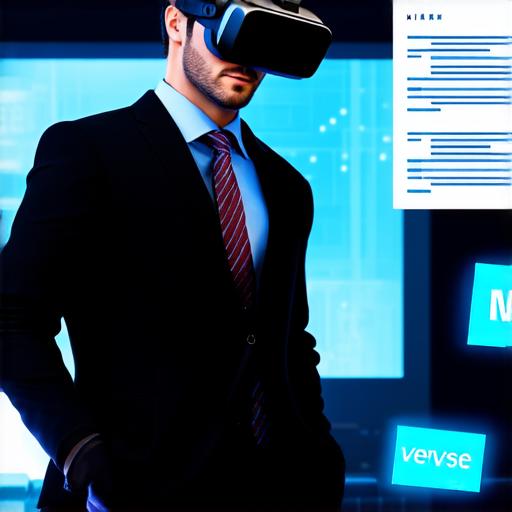What is the Metaverse?
The metaverse is a virtual reality that allows users to interact with each other in a digital environment. It is a decentralized system, meaning it is not controlled by any single entity or organization. Instead, it operates on a network of interconnected computers and servers that allow users to create and experience their own virtual worlds.
The concept of the metaverse dates back to the 1960s when computer scientists first began developing virtual reality technologies. However, with advancements in technology and the rise of social media and mobile devices, the idea of a fully immersive virtual world has become more accessible than ever before.
Implications for the Job Market
The metaverse presents both opportunities and challenges for job seekers. On one hand, it opens up new avenues for work and education that were previously unimaginable. On the other hand, it also poses risks and threats that could impact the stability of traditional industries.

One of the most significant implications of the metaverse for the job market is the potential for increased automation. As more tasks become automated, jobs that involve repetitive or routine tasks may become obsolete. However, this also presents an opportunity for job seekers to acquire new skills and adapt to the changing job landscape.
Another implication of the metaverse is the rise of the gig economy. In the metaverse, workers can be hired on a project-by-project basis, allowing them greater flexibility and autonomy in their work. This also means that companies may have access to a larger pool of talent, making it easier for them to find skilled workers.
How Job Seekers Can Take Advantage of the Metaverse
Despite the potential risks and challenges, there are many ways that job seekers can take advantage of the metaverse. Here are some tips:
-
Learn new skills: With the rise of automation and the gig economy, it’s essential to stay up-to-date with the latest technologies and trends. Consider enrolling in online courses or workshops that teach skills relevant to the metaverse, such as virtual reality design or programming.
-
Network with other professionals: The metaverse presents an opportunity to connect with people from all over the world who share your interests and goals. Join online communities or forums related to the metaverse and engage in conversations with others in your field.
-
Build a personal brand: In the metaverse, your personal brand is essential to your success. Consider creating a portfolio of your work or developing a social media presence that showcases your skills and expertise.
-
Be open to new opportunities: The metaverse is still in its early stages, and there are many opportunities for innovation and experimentation. Keep an open mind and be willing to try new things.
Case Studies
Here are some real-life examples of how the metaverse is impacting the job market:
-
Decentralized Finance (DeFi): DeFi is a new financial system built on the blockchain that allows users to participate in decentralized exchanges and lending platforms. This has created new opportunities for traders, developers, and other professionals in the finance industry.
-
Gaming: The gaming industry has been one of the earliest adopters of the metaverse, with virtual reality games becoming increasingly popular. This has created new job opportunities in game design, programming, and marketing.
-
Education: Virtual reality technologies are being used to create more immersive and engaging educational experiences. This has created new opportunities for educators and trainers who specialize in developing VR content.
FAQs
1. What is the future of work in the metaverse? It’s difficult to predict exactly how the metaverse will evolve, but it’s clear that it will have a significant impact on the way we work.
Answer: The metaverse has the potential to revolutionize the way we work by creating new opportunities for collaboration, learning, and innovation. As the technology continues to evolve, we can expect to see more jobs that involve working in virtual environments, as well as new industries and sectors emerging in response to the growing demand for metaverse-related services.
2. Will my current job be replaced by automation in the metaverse? It’s possible that some jobs may become obsolete as automation and the gig economy continue to grow. However, this also presents an opportunity for job seekers to acquire new skills and adapt to changing technologies.
Answer: While it’s true that some jobs may be replaced by automation in the metaverse, there will also be a growing demand for workers with specialized skills in areas such as virtual reality design, programming, and content creation. By staying up-to-date with the latest technologies and trends, job seekers can position themselves to take advantage of these new opportunities.
